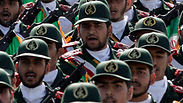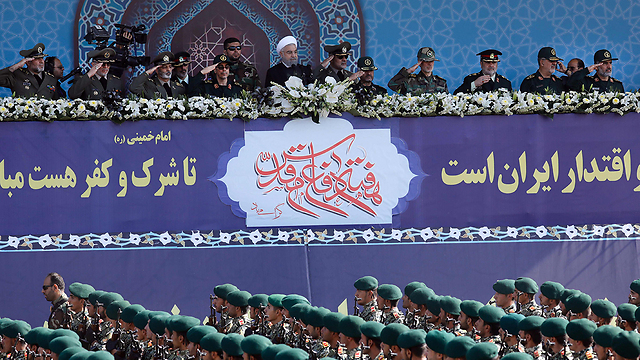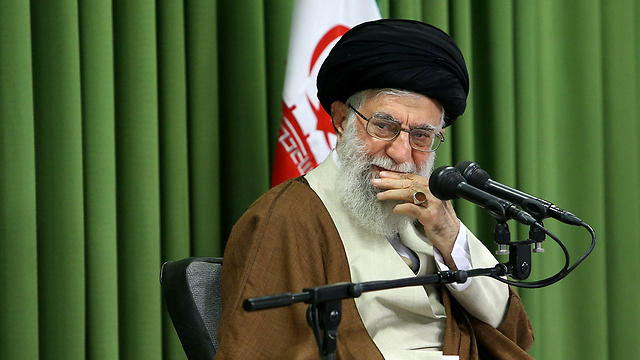

Iran’s dilemma: A military conflict with Israel, yes or no?
Analysis: Some experts believe Iranian military leaders’ stance differs fundamentally from the Revolutionary Guards’ fiery stance. They are aware of Israel’s military and intelligence abilities, aren’t looking for a conflict with us and understand that it’s a dangerous and unrealistic adventure.
As far as Iran is concerned, Khomeini's revolution failed to achieve its goals and to create an attractive precedent for other nations. A huge failure.
The real income per capita in Iran grew by an average of 0.5 percent a year since 1980 and hasn’t grown at all in the past decade. What used to be an industrial-technological power turned into a junk yard and a black market of desired consumer goods from the West and from neighboring Arab countries.
Iran’s economy is fed by oil alone, and it still lacks investments (according to official statements) of approximately $200 billion to revive the neglected oil and gas industries. Its leaders’ craze to develop a nuclear weapon nearly destroyed the country, due to the international sanctions and the allotment of rare resources to a futile project.
To the citizens’ disappointment, the lifting of sanctions in the past two years helped improve Iran’s situation only on the margins. Productive Western capital hasn’t flow into Iran and its presence in global-civilian arenas has remained insignificant.
This is hardly surprising: Forty-five percent of the Iranian economy is owned by the government, about one-third is owned by the Revolutionary Guards and about one-fifth is owned by corrupt, unsupervised religious associations that are subject directly to the supreme leader. The unemployment rate among young Iranians is nearly 28 percent, only 15 percent of women participate in the labor force, and the Iranian currency’s exchange rate in the free market is dozens of percentage points lower than its official exchange rate.
This has now been joined by further trouble, which somewhat explains the Tehran regime’s nervous conduct: First, US President Donald Trump’s threat to walk away from the international agreement to reduce the sanctions in exchange for a termination of the Iranian military nuclear program, a threat which is nudging the European partners into eyeing an agreement that will step up the sanctions; second, the anti-Iranian atmosphere in the Arab world in light of Tehran’s support of Bashar Assad's murderous regime; and third, the reconciliation agreement that is taking shape between North Korea and the United States, under which Pyongyang will completely give up the development of a nuclear weapon—a considerable blow to Tehran’s military programs.
Add that to the problems in the Kremlin. Putin’s Russia is far from being a strong, stable and developed country. The scientific-technological gap between Russia and the West is much wider today than it was at the end of the communist era. President Vladimir Putin’s declarations about modern types of weapons his country is allegedly going to develop are pure illusions. Sooner or later, Putin and members of his close circle will realize that the Russian presence in Syria is a burden rather than an asset. Russia’s miserable failure to prevent the American-British-French attack on Assad's army and its desperate attempt to create a false cover story for the use of the chemical weapons are proof of that.
In their time of need, the conservative elements in Iran (led by the Revolutionary Guards) may see a limited conflict with Israel as an escape from the isolation and internal weakness, as a way to gain the Arab masses’ sympathy and enlist Putin as a “peace maker.” On the other hand, a quick defeat in a conflict or an unexpected entanglement could lead to a collapse of the regime in Tehran, as history sometimes shows.
Some experts on Iran believe that the military leaders’ stance differs fundamentally from the fiery stance of the Revolutionary Guards’ speakers. The latter are inclined to believe that it’s worth fighting for several bases in Syria to allow them to fulfill their old dream of turning Lebanon into an “Islamic republic” too. The former are aware of Israel’s military and intelligence abilities, aren’t looking for a conflict with us and understand that it’s a dangerous and unrealistic adventure, which will be bad for Iran. Israel, they warn, has already made it clear that it is determined not to allow the Iranians to entrench themselves on in Syria at all costs, and it is dead serious; and in the international arena, Putin is already starting to ingratiate himself with Trump.
All this does not necessarily prevent a limited Iranian-Israeli conflict. Wars in the Middle East are unpredictable and are usually strategically irrational too.

















